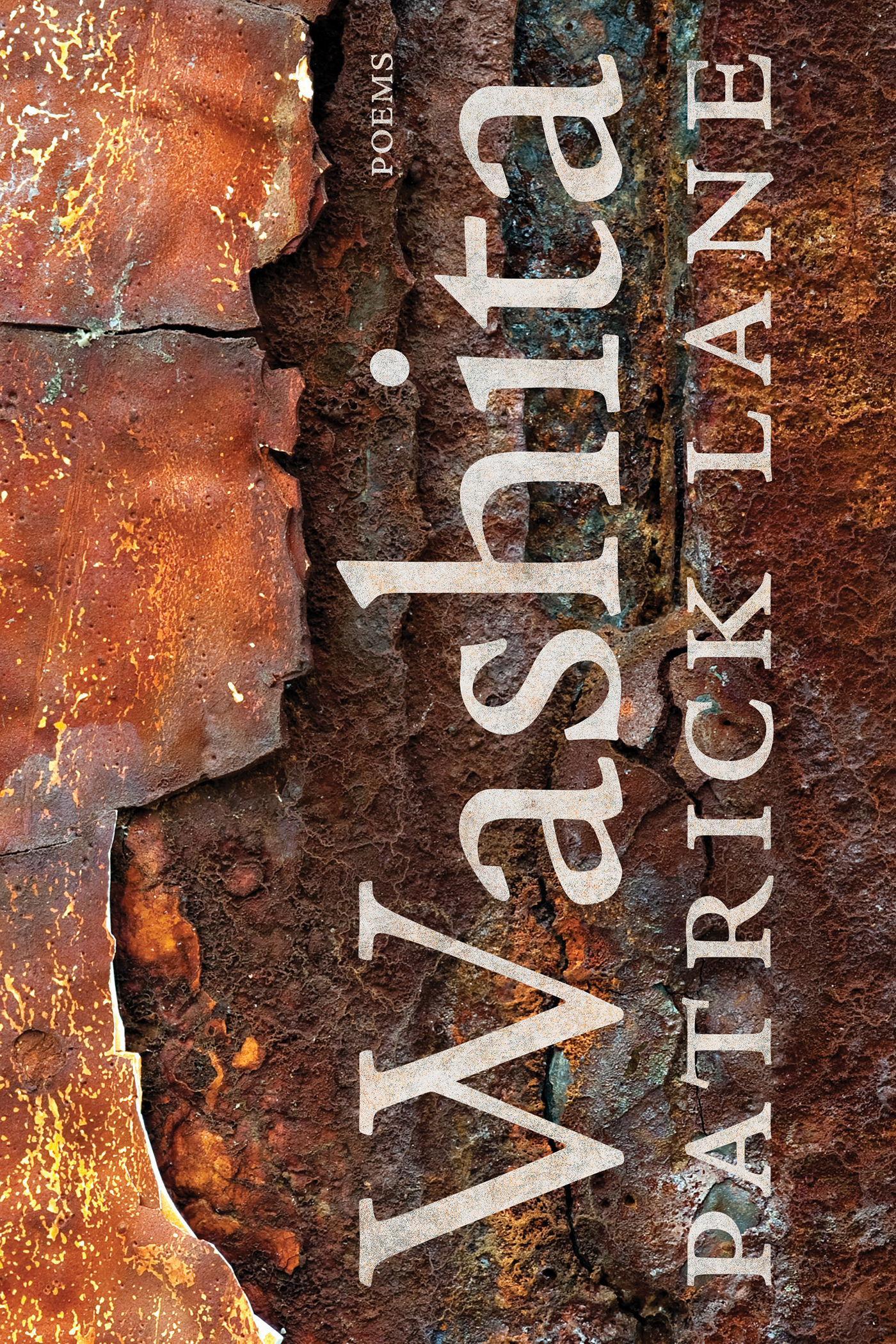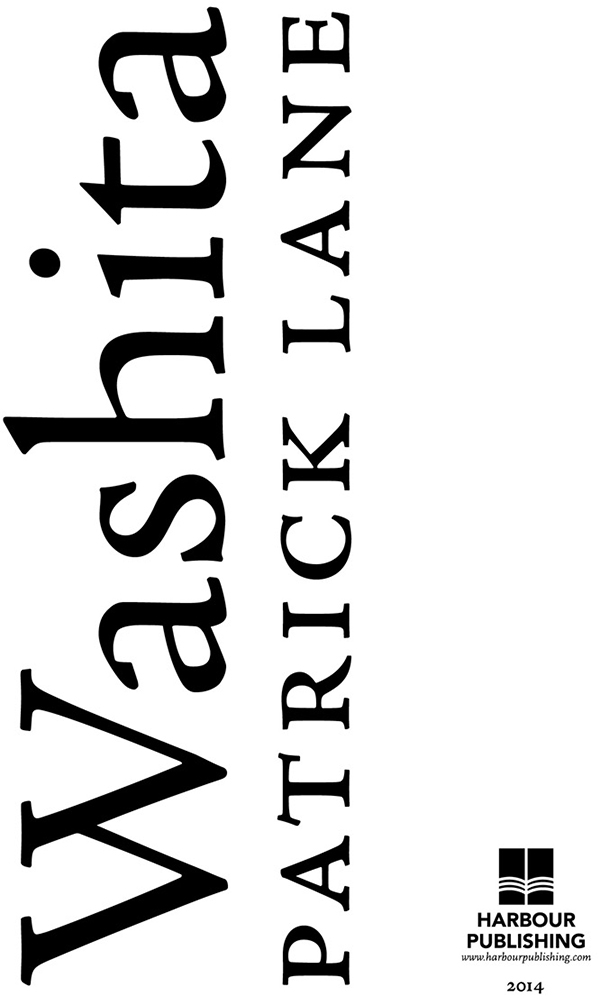Washita


Washita

Copyright © 2014 Patrick Lane
1 2 3 4 5 â 18 17 16 15 14
All rights reserved. No part of this publication may be reproduced, stored in a retrieval system or transmitted, in any form or by any means, without prior permission of the publisher or, in the case of photocopying or other reprographic copying, a licence from Access Copyright, www.accesscopyright.ca, 1-800-893-5777, [email protected].
Harbour Publishing Co. Ltd.
P.O. Box 219, Madeira Park, BC, V0N 2H0
www.harbourpublishing.com
Cover photograph by Frank I. Reiter
Edited by Elaine Park
Cover and text design by Carleton Wilson
Printed and bound in Canada


Harbour Publishing Co. Ltd. acknowledges financial support from the Government of Canada through the Canada Book Fund and the Canada Council for the Arts, and from the Province of British Columbia through the BC Arts Council and the Book Publishing Tax Credit.
Cataloguing information available from Library and Archives Canada
ISBN
978-1-55017-676-6 (paper)
ISBN
978-1-55017-677-3 (ebook)
This book is for Lorna
as always
“a boy in autumn playing upon an oat-stem flute”
ARROYO
The dead do not come riding dark horses up out of the arroyo.
They do not arrive in dust, grey-shrouded, singing the old songs.
No, they arrive like turnips pulled winter-burned and cold from the soil.
They lie at your feet, worm-riddled, creased with dirt in the furrows,
fallen peasants left behind in the caterpillar treads of tanks.
And the rags left on the dump by Mandelstam, the holes in the snow by the aspens.
You kneel by the turnips and plead forgiveness; beg the cold winds abate,
that the green world come back, that every seed left dying come again to life.
The stories they told you as a child are rocks in your skull.
That tiny girl in the winter ditch weeping as the logging trucks rolled by.
Her dress was pale as her mother's eyes.
You lie in the long unwinding, wet with worm casts, your tongue burned by salt.
It will take more years than you remember to warm her small hands.
ARS POETICA
A man should not dream of the frilled skirts of the hooves of horses.
An apple should not be eaten with the burned shadow of a leaf in its flesh.
A woman should bury her man's nail clippings under the dark moon.
There should be no trail to that place, no trail to the fragments of his hair, his spittle.
A mole's tooth, a cat's tail, the heart of a dog, the eye of a frog.
Bring none of these as gifts to the year's first lamb.
A man should not be witness to his daughter's birth or dress his mother's corpse
(This last the teaching of the Greeks on Ios).
A man should burn the branches of the weeping willow. Should he,
Then his sons will have sons, his daughters ovens.
A mother says you should leave your footprint in the dust of her grave
So the wind will remember her. But that mother is dead now.
And the wind forgets and forgets without mercy her passing.
âAfter Czeslaw Milosz's poem, “Should, Should Not”
ASSINIBOINE
Deep summer nights and you, far off, quiet in the dawn.
That last morning the mute swans were on the river and I was unclean.
I placed hot stones in water as you told me of the old people
beside the slow current singing. If I look hard enough I believe
I can see the swans slide past on that long river going toward the lake.
It took many stones, you weaving grouse feathers in your hair, and laughing.
Do you remember the swans? The birds whose wings were song?
Your mother told you they were ghost birds.
But she was crazy
, you said.
And then the city and you lost again in the bars, the empty rooms.
It was the time one of my last lives was changing.
I looked hard, but there was no finding you.
I turned all the way around then and headed west toward the grey rain.
It was a far way, that walking to the place where the sun drowns.
BARRANQUILLA
There were days he stared at himself in wonder.
His body on the floor, the vodka dribbling from his mouth.
The geraniums in the toilet bowl.
That bar in Barranquilla years ago, the man with the thin blade leaving.
Or the half-blind boyâpracticing being
a man in front of his mother's mirror.
1951.
A paring knife in his small hand:
fuck you, fuck you!
Wanting what he is, not what he was.
The
compadres
in the bar moved away, not wanting to be a part of it.
Vete a la mierda, hijo de puta!
Hate is beautiful in Spanish.
Contempt too, the woman at the table counting the money
.
Even now he is unsure if any of it is true.
But there was the outline of a snake carved into that pine headboard:
Hermoso, sÃ.
Shadows mostly, chimera, ghosts.
BOKUSEKI
Iris blades cut through the last ice on the pond.
Emblems of endurance, they are what a man knows
who asks of the grey clouds they witness his passing.
I don't know where the water goes, remember the thin creek
I drank from when I lived in that cabin by the sea.
The doe grazed among fallen apples in my yard.
When I shot her she hung for a moment in the sky.
There were days back then I lived without regard for life.
Forgiveness comes hard.
Each year I rake the leaves and burn
the winged seeds of maples in the flames.
I kneel by the pond and ask where I am going,
what it is I must do. Bokuseki, these iris blades in ice.
When the rain dries on my palms it leaves the trace of Gobi dust.
Each night I breathe a far desert, vestiges of the fall.
BONSAI
Ts'ze, you love the sheep. I love the ceremony.
âThe Analects of Confucius,
Book
III
, Chapter
XVII
The jay screams his morning song in the derelict pine
as I trim the stump of the old cherry tree.
Even with gloves my hands remember the cold,
remember breaking these wrists when I was a boy.
My arms mended wrong.
On the weathered board by the pond, five bonsai,
their leaves red as spilled blood.
Autumn maples grown from feathered seeds.
Bonsai.
How carefully I torment them every fall, cutting back their limbs and roots.
My chainsaw lies among the scattered rounds of the cherry tree.
Among my fingers, torn ribbons of wind.
In the pond the winter fish consume themselves slowly. Waiting.
So too the night.
Water has its way under the ice.
The jay laughs as he torments the day. And I say,
Never mind
.
BOXWOOD
The child splitting kindling in the cold shed at dawn
is learning how to trust the eye, not the hand,
and not the hatchet, for these last go where the eye wills.
Still, the child will cut himself more than once
until he learns to go past the eye, the kindling falling
like music, sprung notes clear in the morning.
BYA JHATOR
“I want to believe in one place,” he said. “I want it in my blood.”
â
Olen Steinhauer,
The Bridge of Sighs
Three vultures in the ditch below Hartland dump.
A doe lifts her head from the gravel.
Bright dawn and images, this false world.
A vulture takes a hop, a loop of gut in its beak.
Why now, this song of tired messengers?
The doe's eyes, curious, ask nothing of me.
Hers is a modesty I can't touch.
The earth is everywhere and scant.
Infinitesimal creatures rise up to prey on us from the offal we wade in.
As the vulture, we piss on our naked legs and hiss.
I give, as always, alms to the birds, a sky burial, a breath in flight.
The volt hulks on the bare branches of the dead fir.
It is one place, rock, not stone.
CALLIGRAPHY
It was before the plum blossoms. Before that.
Before the mist and the wind rising from the sea.
And the little brown bats in the false dawn gorging on fragrant moths.
The feast that is the promise of light.
The raccoon was only a tail, a slip in the failing shadow.
And Basho coming home, his ear torn, happy with the night.
And, please, before I forget.
Write this.
Write this down:
the old rat turns and turns in his paws a delicate seed.
And the Horned owl meditates upon death on the yard pole.
O, and yes, before the pilgrim sea lion's moon song
was your hand in my hand in the dark.
CLOSE
Snow dust in the pines and the shadows of swans on skim ice.
The surface breaks and sweet water swims in their feathers.
What joy to sing a last song to the moon.
Twilight is upon me. My poor eyes gather in the dusk.
Surely the earth trembles at the hummingbird's heart in the egg.
The beating knot at the end of a sentence. Large as that.
Among spiderwebs and moss a life will cry come spring.
The Chinese called their Gobi dead
red dust.
What shall I call you?
Tonight I took my shorn hair and laid it on the arms of the pines.
In the morning the hummingbirds will line their nests with me.
COWICHAN VALLEY POEM
The heron has only one leg
and he stands on both of them.
DISPENSATION
I see the dragonfly and the lily through a grey veil.
The clarity is like what I would like to remember
fine wine is and can't because the distance is too great.
But the accuracy is there in spite of the refusal.
Yesterday I went to the garden as my mother did
in the surety of solitude, my crawling into the dark
in search of skeleton weed and hawkweed,
ragwort, spurge, hound's tongue, toadflax.
The barren earth is what I want, the coolness there.
I know I almost know.
I am by the yellow lilies at the pond
staring at the water through the fretful wing of a dragonfly.
What is this divinity that I must search for it again?
My mother kneels under the mimosa, demure.
Which she wasn't. But that I see her so
through the dragonfly's pellucid wing. Going blind slowly.
The deep beyond the gossamer. The purity of that.
